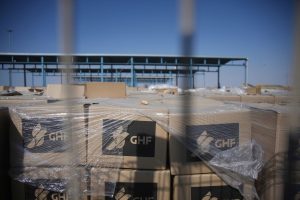JERUSALEM (AP) — The U.S.- and Israel-backed Gaza Humanitarian Foundation, set up to distribute aid to Gaza as an alternative to the United Nations but which Palestinians said endangered the lives of civilians as they tried to get food, said Monday it would shutter operations.
The company had already closed distribution sites after a U.S.-brokered ceasefire took effect six weeks ago in Gaza. It announced Monday that it was permanently shutting down, claiming it had fulfilled its mission. “We have succeeded in our mission of showing there’s a better way to deliver aid to Gazans,” GHF director John Acree said in a statement.
Also Monday, Israel’s defense minister clashed publicly with the military’s chief of staff over the army’s latest probes of its failures in the Oct. 7 attack on Israel by Palestinian militants that sparked the Israel-Hamas war.
The operations of the GHF were shrouded in secrecy during its short time in operation. Launched with U.S. and Israeli backing as an alternative to the United Nations, the group never revealed its sources of funding and little about the armed contractors who operated the sites.
It said its goal was to deliver aid to Gaza without it being diverted by Hamas.
Palestinians, aid workers and health officials have said the system forced aid-seekers to risk their lives to reach the sites by passing Israeli troops who secured the locations. Soldiers often opened fire, killing hundreds, according to witnesses and videos posted to social media. The Israeli military says it only fired warning shots as a crowd-control measure or if its troops were in danger.
GHF said there was no violence in the aid sites themselves but acknowledged the potential dangers people faced when traveling to them on foot. However, contractors working at the sites, backed by video accounts, said the American security guards fired live ammunition and stun grenades as hungry Palestinians scrambled for food.
GHF shutters
Acree said that GHF would hand off its work to the U.S.-led center in Israel overseeing the Gaza ceasefire, called the Civil-Military Coordination Center.
“GHF has been in talks with CMCC and international organizations now for weeks about the way forward and it’s clear they will be adopting and expanding the model GHF piloted,” he said.
Tommy Piggott, a deputy spokesperson for the U.S. State Department, said on the social media platform X that GHF had “shared valuable lessons learned with us and our partners.”
GHF began operating in late May, after Israel had halted food deliveries to Gaza for three months, pushing the population toward famine.
Israel intended for the private contractor group to replace the U.N. food distribution system, claiming Hamas was diverting large amounts of aid. The U.N. denied the claims.
The U.N. had opposed the creation of GHF, saying the system gave Israel control over food distribution and could force the displacement of Palestinians. Throughout the war, the U.N. led a massive humanitarian effort with other aid groups, distributing food, medicine, fuel and other supplies at hundreds of centers around Gaza.
In the release, GHF said it had delivered over 3 million food boxes to Gaza, totaling 187 million meals.
Israel’s military chief and defense minister in rare public clash
Israeli Defense Minister Israel Katz and military Chief of Staff Lt. Gen. Eyal Zamir clashed publicly on Monday over the army’s investigation into what happened Oct. 7, 2023, when Hamas-led militants killed around 1,200 people, mostly civilians, and abducted 251 people to Gaza.
Katz has said earlier that he would order a re-examination of the military’s latest internal review. He also said he would be freezing new appointments in the army pending the conclusions of this new review. Israel’s government has long resisted the establishment of a state commission of inquiry into the Oct. 7 attack.
In response, Zamir said in a sharply worded statement Monday that the defense minister’s move was “puzzling” and “not substantive.” He said that freezing appointments would harm the military’s “capabilities and its readiness for the upcoming challenges” and claimed he would continue to “hold posting discussions as planned, in accordance with his authority.”
The army “is the only body in the country that has thoroughly investigated its own failures and taken responsibility for them,” wrote Zamir. “If any further examination is required to complete the picture, it must take the form of an external, objective and independent commission” that will also probe “the interface between the military echelon and the political echelon.”
Moments after Zamir put out the statement, Katz doubled down on his decision, releasing a statement saying he “respects” the military chief of staff, “who knows very well that he is subordinate to the prime minister, the defense minister, and the government of Israel.” He added he “does not intend to argue in the media” and re-asserted his authority to decide on military appointments.
Following the military’s latest review, Zamir sanctioned 13 army officials who were top commanders on Oct. 7, 2023, censuring some and forcing others into retirement.
The Oct. 7, 2023 attack kickstarted the war in Gaza, in which over 69,700 Palestinians have been killed and over 170,800 injured, according to Gaza’s Health Ministry.
The ministry does not distinguish between civilians and combatants in its figures but has said women and children make up a majority of those killed. The ministry, part of the Hamas-run government and staffed by medical professionals, maintains detailed records viewed as generally reliable by independent experts.
——-
Melzer reported from Nahariya, Israel.
By JULIA FRANKEL and NATALIE MELZER
Associated Press

